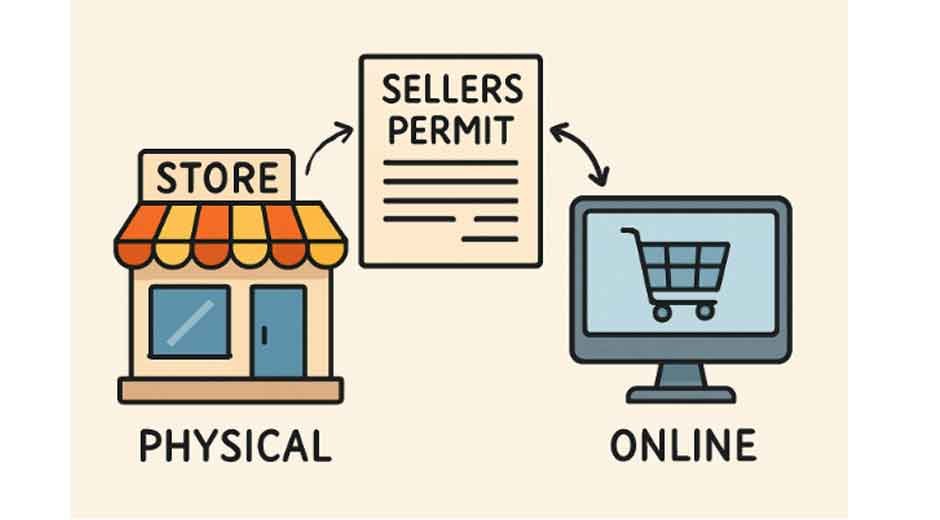What Is a Seller’s Permit?
A seller’s permit is a legal authorization that allows businesses to collect and remit sales tax on goods and taxable services. It is fundamental for companies operating in retail, wholesale, or specific service industries as it enables them to comply with state tax laws. New business owners can significantly streamline their compliance efforts by completing a sales tax application online, which is often faster and more convenient than traditional methods.
With a seller permit in place, businesses are responsible for collecting sales tax from customers and remitting those funds to state and local revenue agencies. This process keeps businesses compliant and contributes essential tax revenue that supports public services such as education, infrastructure, and health programs, as described in resources such as the New York Times.
When Is a Seller’s Permit Required?
Most businesses that sell tangible goods—whether through physical storefronts, online shops, at pop-up markets, or trade shows—must obtain a seller’s permit before making any sales. State laws dictate the specifics, but even home-based entrepreneurs and online sellers typically need a license if their operations result in taxable sales. Rules can get particularly complex for online businesses, given that many states now require permits when sales to customers in that state surpass a certain threshold, even if the company doesn’t have a physical presence there.
Understanding the nuances of when a seller’s permit is necessary can also help avoid potential issues with sales tax collection. Ignorance of the law is rarely an excuse; non-compliance can jeopardize a business’s reputation and finances.
Steps to Obtain a Seller’s Permit
- Review your state’s prerequisites for your business type and the goods or services you offer.
- Collect essential documentation, such as your business license, federal EIN or Social Security Number, and entity registration forms.
- Complete the sales tax application online or apply to your state’s revenue department.
- Pay any applicable fees required by the state for the permit processing.
- Once approved, display your seller’s permit at your place of business or on your digital storefront as required by local regulations.
Processing times and documentation may vary widely from state to state. For the most accurate details, consult your state government’s official website or seek guidance from your local chamber of commerce.
Common Challenges for New Entrepreneurs
New business owners often struggle with the complexity of paperwork and learning which regulations apply at the state and federal levels. According to the U.S. Small Business Administration, common compliance errors include missing paperwork, misunderstanding tax rates by jurisdiction, and failing to renew permits as required. These avoidable missteps can result in fines, penalties, or operational delays.
Businesses may also encounter challenges if they expand into new states or add new product lines, triggering additional permit or tax obligations. Staying proactive and informed can prevent most of these issues from derailing growth.
Compliance and the Role of a Seller’s Permit
A valid seller permit gives businesses the legal footing to operate and conduct sales in their jurisdiction. It creates a framework for collecting, tracking, and remitting sales tax accurately, which is especially valuable when tax season arrives. By maintaining strict compliance with state and local requirements, business owners reduce exposure to penalties and build credibility with consumers and oversight agencies. Diligent sales tax reporting also helps establish a record of responsible business practices, which may be beneficial in securing business loans or partnerships.
State-by-State Variations
Seller’s permit requirements are not uniform across the United States. Some states, such as Oregon and New Hampshire, do not collect state sales tax, while others have unique rules for cities and counties layered on top of state law. In recent years, introducing “economic nexus” rules has meant that an out-of-state business may need a permit if it surpasses specific sales volumes or transaction counts within a state. Keeping up-to-date with state-by-state requirements is crucial; resources such as the Forbes Advisor offer guides to national sales tax compliance that can help businesses stay clear.
Businesses expanding to online sales across state lines should pay close attention, as failing to comply with updated nexus laws can lead to back taxes or enforced closure.
Tips for Staying Organized
- Maintain digital and physical copies of your seller’s permit and keep documentation for renewals.
- Use accounting software to track all sales, collected tax, and remittances for accurate record-keeping.
- Set recurring alerts for renewal deadlines to ensure you stay current and avoid accidental lapses.
- Appoint a knowledgeable team member or third-party advisor responsible for monitoring regulatory updates in your business’s home and active states.
Establishing and following clear administrative procedures early in the business journey saves valuable time and dramatically reduces the risk of non-compliance or tax-related errors.
Frequently Asked Questions
- Is a seller’s permit the same as a business license? A seller’s permit authorizes the collection and remittance of sales tax, while a business license is the basic credential granting the right to operate legally.
- Can I apply for a seller’s permit online?Yes, most states have streamlined this process so you can apply for a license via your state’s online portals.
- Do I need a seller’s permit for online sales?In most cases, yes, if you sell taxable goods. State-specific economic nexus rules apply, so double-check requirements based on your customers’ location.
- What happens if I sell without a permit?Selling without a valid seller’s permit can result in financial penalties, repayment of back taxes, and even business closure, depending on the severity and local laws.
Ensuring compliance from the start helps new businesses avoid fines, build customer trust, and operate confidently. By securing the proper permits and understanding related regulations, entrepreneurs can focus more on growth and less on legal setbacks, creating a strong foundation for long-term success and stability.






